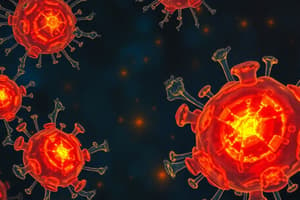Podcast
Questions and Answers
What is the role of a T helper cell in cell-mediated specific immune response?
What is the role of a T helper cell in cell-mediated specific immune response?
- Causing inflammation at the site of infection
- Directly attacking infected cells
- Releasing antibodies to neutralize pathogens
- Activating other immune cells and coordinating the immune response (correct)
What is the main function of a T killer cell in the cell-mediated specific immune response?
What is the main function of a T killer cell in the cell-mediated specific immune response?
- Producing antibodies to fight pathogens
- Promoting inflammation at the site of infection
- Destroying infected cells by inducing apoptosis (correct)
- Secreting cytokines to attract other immune cells
What are the steps involved for a T killer cell to lyse an infected cell?
What are the steps involved for a T killer cell to lyse an infected cell?
- Proliferation, differentiation, and migration
- Antigen presentation, antibody production, and phagocytosis
- Recognition, activation, and killing (correct)
- Inflammation, chemotaxis, and opsonization
Match the following components with their roles in cell-mediated specific immune response:
Match the following components with their roles in cell-mediated specific immune response:
Match the following steps with the process of T killer cell lysis of infected cells:
Match the following steps with the process of T killer cell lysis of infected cells:
Match the following immune responses with their primary cellular involvement:
Match the following immune responses with their primary cellular involvement:
Flashcards are hidden until you start studying
Study Notes
T Helper Cells in Cell-Mediated Immune Response
- T helper cells play a crucial role in activating and coordinating the immune response by recognizing antigens presented by antigen-presenting cells (APCs) and stimulating the activation of other immune cells, such as T killer cells and B cells.
- They release cytokines, which are signaling molecules that help to activate and coordinate the immune response.
T Killer Cells in Cell-Mediated Immune Response
- T killer cells, also known as cytotoxic T cells, are responsible for direct killing of infected cells or tumor cells that display viral or tumor antigens on their surface.
- The main function of T killer cells is to recognize and eliminate infected cells or tumor cells, thereby preventing the spread of infection and tumor growth.
Steps Involved in T Killer Cell Lysis of Infected Cells
- Recognition of infected cells: T killer cells recognize infected cells through the interaction of their T-cell receptor with the antigen presented by the major histocompatibility complex (MHC) molecules on the surface of the infected cell.
- Release of granules: Upon recognition, T killer cells release granules containing cytotoxins, such as perforin and granzymes, which form pores in the target cell membrane.
- Formation of immunological synapse: The T killer cell forms a tight junction with the infected cell, known as an immunological synapse, which facilitates the delivery of cytotoxins to the target cell.
- Lysis of infected cells: The cytotoxins released by the T killer cell cause the lysis of the infected cell, thereby eliminating the source of infection.
Matching Components with Roles in Cell-Mediated Immune Response
- T helper cells: activate and coordinate the immune response
- T killer cells: direct killing of infected cells or tumor cells
- Antigen-presenting cells (APCs): present antigens to T helper cells
- Cytokines: signaling molecules that help to activate and coordinate the immune response
- Major histocompatibility complex (MHC) molecules: present antigens on the surface of infected cells
Matching Steps with T Killer Cell Lysis of Infected Cells
- Recognition of infected cells: interaction of T-cell receptor with antigen presented by MHC molecules
- Release of granules: release of cytotoxins, such as perforin and granzymes
- Formation of immunological synapse: tight junction between T killer cell and infected cell
- Lysis of infected cells: delivery of cytotoxins to the target cell
Matching Immune Responses with Primary Cellular Involvement
- Cell-mediated immune response: T cells (T helper cells and T killer cells)
- Humoral immune response: B cells
Studying That Suits You
Use AI to generate personalized quizzes and flashcards to suit your learning preferences.




